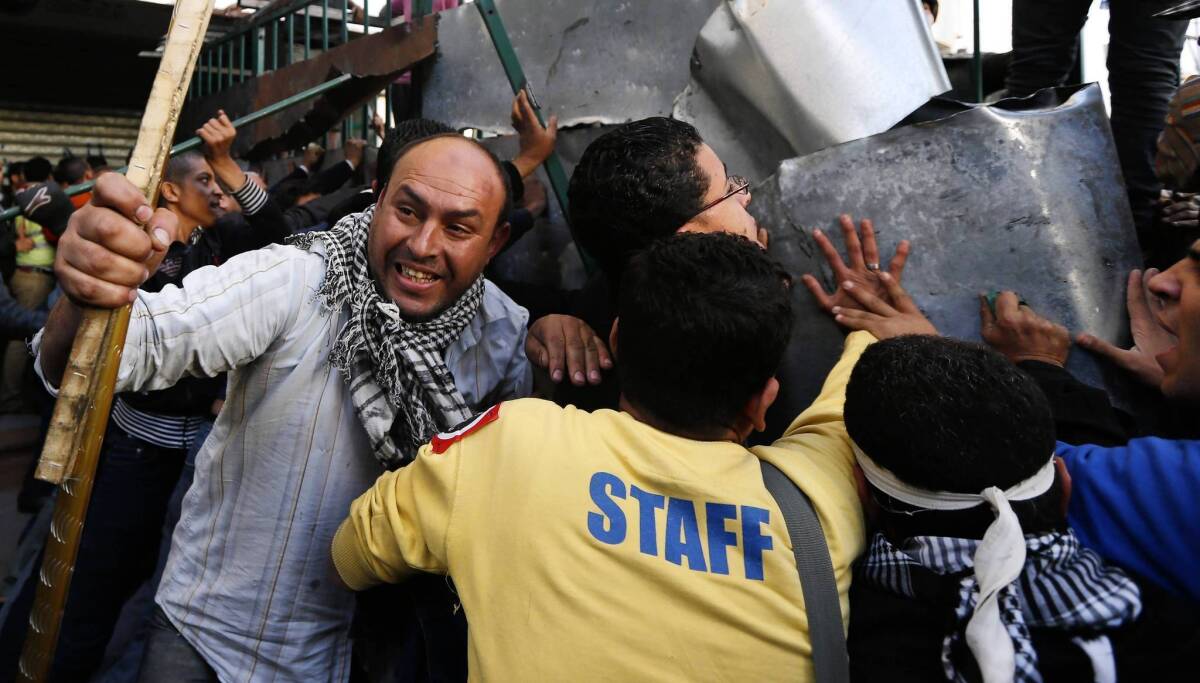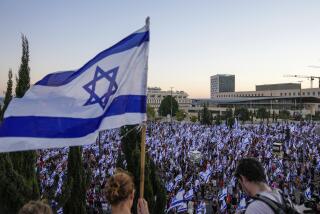Egypt’s proposed constitution spurs competing protests

- Share via
CAIRO — Egypt’s volatile political fault lines were shaken Tuesday as rival protests echoed across the capital over the fate of a proposed constitution drafted by Islamists nearly two years after the overthrow of autocrat Hosni Mubarak.
Tens of thousands of Islamist supporters of President Mohamed Morsi rallied at a mosque in Cairo to back a constitutional referendum set for Saturday. Two miles away, mainly secular opposition groups marched to the barricaded presidential palace in what increasingly appears to be an improbable task of blocking the vote and forcing Morsi to order the writing of a new charter.
The two sides, viscerally passionate and far from compromise, symbolized the divisiveness over the country’s political future and the power held by Morsi and his allies in the dominant Muslim Brotherhood. Liberals and secularists worry that the proposed constitution overshadows civil rights and marks a gradual evolution toward sharia, or Islamic law.
“We are not ready to vote on the constitution,” said Nadia Radwan, a university professor protesting at the palace. “The writing of the constitution itself is vague. We need experts and lawyers to … inform people and interpret the laws. There might be another confrontation with the Brotherhood. They won’t let this go easily.”
The Brotherhood and ultraconservative Salafis are adamant about imposing religion on public life after more than 60 years of secular autocratic rule. That strategy is also the central aim of Islamists in Tunisia, Yemen and Libya after uprisings that have recalibrated the region’s politics and revived the long-suppressed debate over the balance between democracy and political Islam.
“The opposition isn’t just rejecting Morsi. They want to bring down the state and destroy religion,” said Hamed Ahmed Khalil, a carpenter. “I’m an uneducated man, but I have looked through the constitution and I see nothing wrong with it. Morsi must stand strong against the traitorous opposition.”
Tens of thousands of pro- and anti-Morsi demonstrators also turned out in Alexandria and other cities. In Cairo, protesters pushed through a barricade near the presidential palace. The opposition has momentum but lacks cohesive leadership and is divided over whether to boycott the referendum or try to defeat it at the polls.
The credibility of the referendum was challenged when a leading judges organization announced that 90% of its members have refused to supervise the balloting.
Morsi’s government was also contending with protest violence. Police were investigating a shooting that injured nine demonstrators in Tahrir Square. At least eight people have been killed and hundreds injured in clashes between Islamists and opposition groups.
Opposition members, including a former diplomat, have been attacked by Brotherhood supporters. Videos on the Internet show disciplined gangs of Islamists ridiculing and beating anti-Morsi protesters, including several men with bloodied and bruised faces. The Islamists appear to force the frightened protesters to “confess” that they were paid to demonstrate against the president.
Morsi, a conservative Muslim and a fledgling politician, personifies the ideals Islamists cherish and the ones secularists abhor. His palace office is now protected by tanks, barbed wire and tall concrete barriers. In a twist that shows how unsettled and dangerous the nation’s mood has become, Morsi has called on the military, once his chief enemy, to guard public institutions before the vote.
The defense minister and head of the armed forces, Abdel Fattah Sisi, called “for a meeting for humanitarian outreach and national unity for the love of Egypt” between Morsi and various factions. Later in the day, however, a presidential spokesman said, “There was a misunderstanding. There will be no meeting.”
The political tension is unfolding against Egypt’s deepening financial crisis and need for foreign investment. A $4.8-billion loan from the International Monetary Fund was delayed Tuesday until next month because of Morsi’s erratic economic proposals, including calling for tax increases this week and then quickly reversing himself after intense public criticism.
The flip-flop raised questions about Morsi’s judgment and indicated that he did not want to anger Egyptians with austerity measures before the referendum. The nation’s stock market has slid, and the government, which earlier battled water and power shortages, owes billions of dollars to international oil companies.
Since his Nov. 22 decree that expanded his powers, Morsi has offered to scale back some of his authority. But he has refused to meet the opposition’s main demand of postponing the referendum. He has said a constitution is needed to advance Egypt’s political transition, but his opponents say the document was rushed and marked by references to sharia that could be exploited by religious conservatives.
“The Egyptian people have spoken and they insist on removing Morsi,” said Mohamed Eid, a pensioner outside the palace. “Morsi is moving against the Egyptian current and he’s divided us by drawing a line between Islamists and average Egyptians. In my 60 years, I’ve never seen Egypt this divided.”
Abdellatif is a special correspondent.
More to Read
Sign up for Essential California
The most important California stories and recommendations in your inbox every morning.
You may occasionally receive promotional content from the Los Angeles Times.











